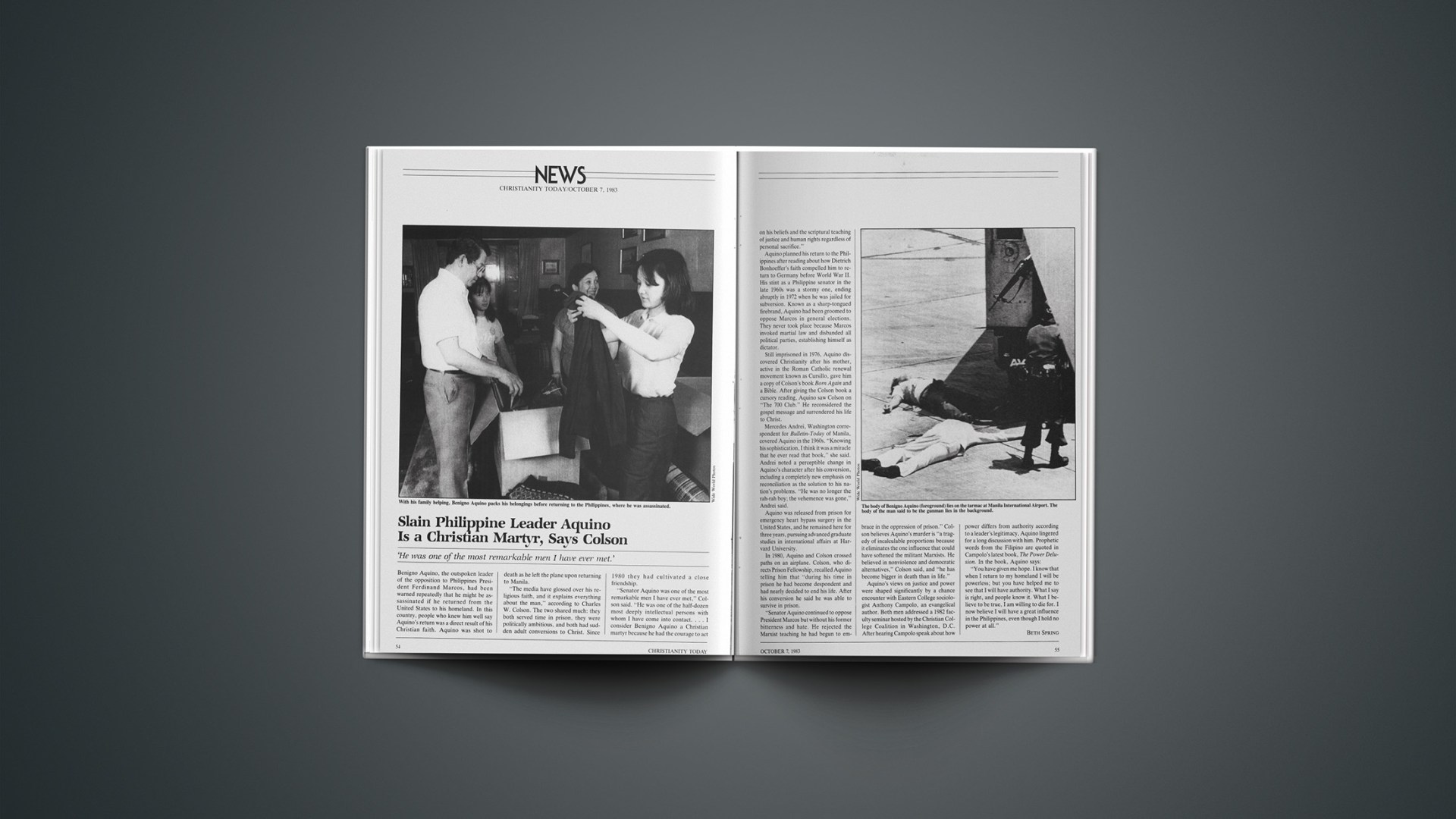‘He was one of the most remarkable men I have ever met.’
Benigno Aquino, the outspoken leader of the opposition to Philippines President Ferdinand Marcos, had been warned repeatedly that he might be assassinated if he returned from the United States to his homeland. In this country, people who knew him well say Aquino’s return was a direct result of his Christian faith. Aquino was shot to death as he left the plane upon returning to Manila.
“The media have glossed over his religious faith, and it explains everything about the man,” according to Charles W. Colson. The two shared much: they both served time in prison, they were politically ambitious, and both had sudden adult conversions to Christ. Since 1980 they had cultivated a close friendship.
“Senator Aquino was one of the most remarkable men I have ever met,” Colson said. “He was one of the half-dozen most deeply intellectual persons with whom I have come into contact.… I consider Benigno Aquino a Christian martyr because he had the courage to act on his beliefs and the scriptural teaching of justice and human rights regardless of personal sacrifice.”
Aquino planned his return to the Philippines after reading about how Dietrich Bonhoeffer’s faith compelled him to return to Germany before World War II. His stint as a Philippine senator in the late 1960s was a stormy one, ending abruptly in 1972 when he was jailed for subversion. Known as a sharp-tongued firebrand, Aquino had been groomed to oppose Marcos in general elections. They never took place because Marcos invoked martial law and disbanded all political parties, establishing himself as dictator.
Still imprisoned in 1976, Aquino discovered Christianity after his mother, active in the Roman Catholic renewal movement known as Cursillo, gave him a copy of Colson’s book Born Again and a Bible. After giving the Colson book a cursory reading, Aquino saw Colson on “The 700 Club.” He reconsidered the gospel message and surrendered his life to Christ.
Mercedes Andrei, Washington correspondent for Bulletin-Today of Manila, covered Aquino in the 1960s. “Knowing his sophistication, I think it was a miracle that he ever read that book,” she said. Andrei noted a perceptible change in Aquino’s character after his conversion, including a completely new emphasis on reconciliation as the solution to his nation’s problems. “He was no longer the rah-rah boy; the vehemence was gone,” Andrei said.
Aquino was released from prison for emergency heart bypass surgery in the United States, and he remained here for three years, pursuing advanced graduate studies in international affairs at Harvard University.
In 1980, Aquino and Colson crossed paths on an airplane. Colson, who directs Prison Fellowship, recalled Aquino telling him that “during his time in prison he had become despondent and had nearly decided to end his life. After his conversion he said he was able to survive in prison.
“Senator Aquino continued to oppose President Marcos but without his former bitterness and hate. He rejected the Marxist teaching he had begun to embrace in the oppression of prison.” Colson believes Aquino’s murder is “a tragedy of incalculable proportions because it eliminates the one influence that could have softened the militant Marxists. He believed in nonviolence and democratic alternatives,” Colson said, and “he has become bigger in death than in life.”
Aquino’s views on justice and power were shaped significantly by a chance encounter with Eastern College sociologist Anthony Campolo, an evangelical author. Both men addressed a 1982 faculty seminar hosted by the Christian College Coalition in Washington, D.C. After hearing Campolo speak about how power differs from authority according to a leader’s legitimacy, Aquino lingered for a long discussion with him. Prophetic words from the Filipino are quoted in Campolo’s latest book, The Power Delusion. In the book, Aquino says:
“You have given me hope. I know that when I return to my homeland I will be powerless; but you have helped me to see that I will have authority. What I say is right, and people know it. What I believe to be true, I am willing to die for. I now believe I will have a great influence in the Philippines, even though I hold no power at all.”










